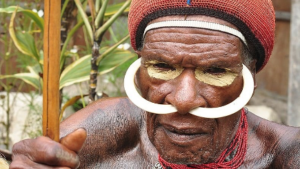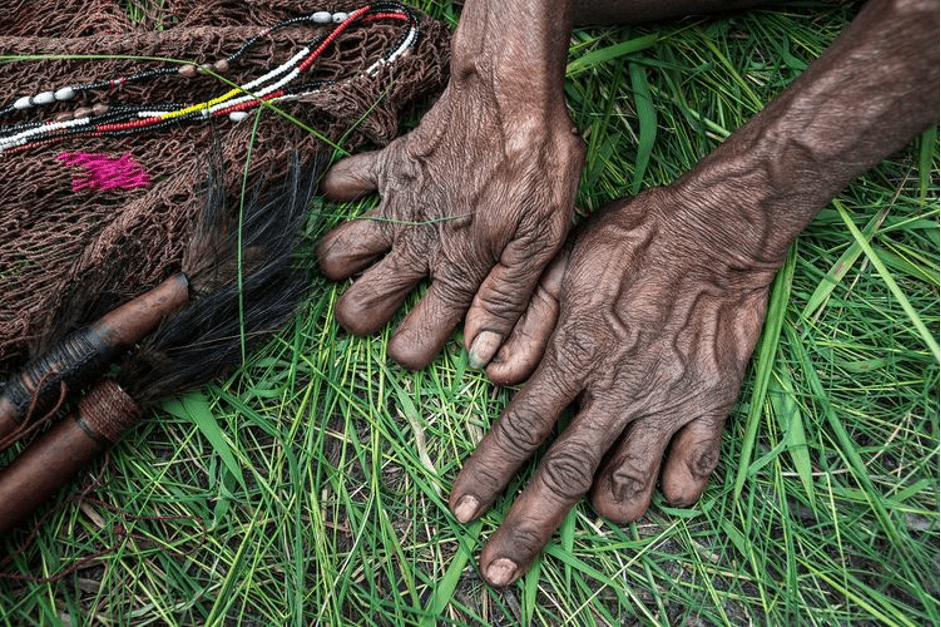PAPUAN – Traditions or traditional values in Indonesia have diversity and cultural values that are generally preserved by the local community, one of the diverse traditions in Indonesia is the tradition of cutting fingers or Iki Palek which is grown and carried out by the Dani Tribe in the Baliem Valley, Papua. Iki Palek is a tradition of cutting fingers, for ordinary people of course this tradition looks terrible, but for the Dani Tribe it has a very deep meaning, cutting the finger is done to express loyalty and a deep sense of loss for family members who have died.
The Dani tribe itself is a tribe that inhabits the Baliem Valley at an altitude of around 1,600 meters above sea level, and is located in the stratigraphic zone of the central mountain range of Irian Jaya, as a result of the phenomenon of geological processes. Its inhabitants work as farmers and are known to have had the technology of using stone axes, bone knives, bamboo, and spears when the Dani Tribe was discovered.
The meaning and philosophy of the cut finger tradition indicates the number of family members who died, that most of those who carry out the tradition are women, but men also do it to show their grief, men show it by cutting the skin of the ear, for the Dani Tribe the finger is considered a symbol of harmony, unity, and strength, besides that, it is also a symbol of living together with one family, clan, house, tribe, ancestors, language, history, and one origin or commonly referred to as “wene opakima dapulik

welaikarek mekehasik”. The shape and length of the fingers have the unity and strength to ease the burden of all work, the fingers will work together, so the hand will function, but if one finger is missing, it will reduce togetherness and strength.
The procession is quite gruesome and the women will cut their fingers by biting until the finger breaks and sometimes it is done with an axe or knife and to reduce the blood that comes out, the finger will be wrapped around with thread and until the blood flow stops and the finger becomes numb then it is cut, and then for men they cut the earlobe using a sharp bamboo blade, the tradition of cutting the earlobe is called the Nasu Palek tradition and if they cannot do it themselves then they will be helped by relatives and there is no special ceremony, if the finger has been cut off then the Iki Palek tradition has been carried out, the wound will be wrapped with leaves and it is estimated that one month later the wound will dry out and become healed.
If the deceased is a parent then two knuckles are cut and if a relative then only one knuckle is cut, before being cut those whose fingers will be cut read the mantra.
The attitude of obedience and respect for ancestors and a sense of love, togetherness for the closest people owned by the Dani Tribe, makes them willing to feel tremendous pain through the procession, the hope is that by cutting the finger so that they can forget their sadness immediately and in addition to cutting fingers, the Dani Tribe also takes a mud bath. It is done as a meaning that all who live will also return to the ground.
The Iki Palek procession itself is rarely carried out by the Dani Tribe although it is still preserved and you will find many mothers with fingers that are no longer intact, people will think that this tradition is very terrible but Indonesia has a variety of unique cultures and must be respected.
This finger cutting tradition is still carried out from generation to generation and survives to this day, even though this tradition has been banned by the Papuan Government, the successors of this tradition continue to carry out the tradition on the basis as a way of remembering ancestors and expressing condolences.


